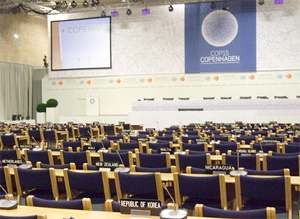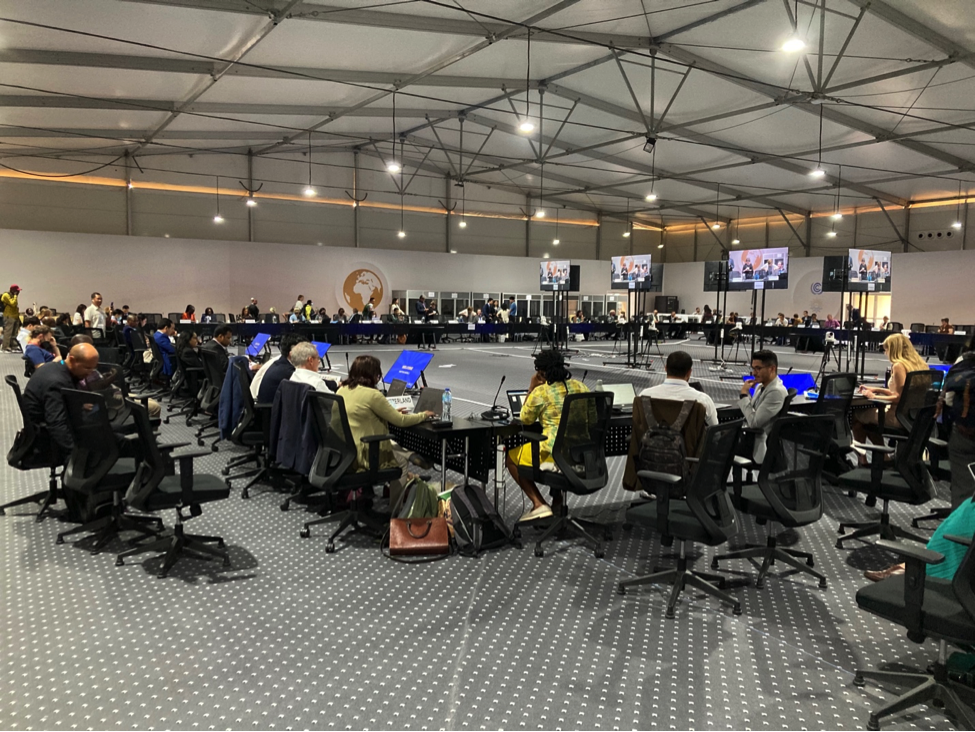By Richmund Sta. Lucia
On March 27, 2018, the Philippine Commission on Human Rights (CHR) held its first hearingon the petition seeking to hold the “Carbon Majors” accountable for contributing to global emissions of greenhouse gases and the resultant impacts of climate change. The said petition requests the CHR to investigate the responsibility for climate-related human rights violations of the so-called “Carbon Majors”—companies engaged in the oil & gas, coal, and cement business that include household names in the energy industry such as Chevron, ExxonMobil, Royal Dutch Shell, and British Petroleum. (In a previous post, we tackled the issue on the jurisdiction of the CHR to investigate the allegations set forth in the petition.) The conduct of the hearing shows initial progress and serious intent on the part of CHR to investigate, gather facts, and shed light on the possible culpability of the respondent corporations.
Conduct of the First Hearing
The public hearing was held on March 27-28, 2018 at the CHR Session Hall in Manila, Philippines. It was streamed live online. On the first day, Mr. Chito Gascon, Chairman of the CHR, gave his opening remarks to start the proceedings dubbed as “National Inquiry on the Impact of Climate Change on the Human Rights of the Filipino People and the Responsibility Therefor, if any, of the ‘Carbon Majors’”. Commissioner Roberto Cadiz chaired the hearing. The petitioners’ counsel entered their appearance; no representatives from the respondents were present.
After the petitioners’ counsel gave their opening statement, they presented six witnesses (also known as “resource persons”) on day one (March 27), including a member of the youth and an indigenous people community, the head of a national association of farmers, a community leader in the rural areas and a vegetable farmer, and a fish vendor whose husband is a fisherman. They narrated how climate change adversely affected their health, livelihood, and overall quality of life. In addition, expert witnesses also gave their testimonies regarding the role of greenhouse gases in the environment, how climate change caused by emissions can be traced to carbon major producers, and observed climate trends and projections in the Philippines. (A video recording of the hearing held on day one can be accessed here.)
On day two (March 28), additional witnesses were presented. A leader of a transportation workers union shared how extreme heat and weather-related events affected their livelihood in the transport sector. Moreover, experts from the University of the Philippines’ Marine Science Institute testified about the role of carbon dioxide in ocean acidification and how such phenomenon makes the Philippines’ coastal areas more vulnerable. Other experts also gave their presentations about the impacts of climate change on human health as well as the nexus between Carbon Majors and industry knowledge on climate science. (A video recording of the day two hearing can be found here.)
During these hearings, the Commissioners often asked clarificatory questions to the witnesses and the counsel of the petitioners. There were also some interesting questions that were raised during the hearing. One of the petitioners, the President of the Philippine Rural Reconstruction Movement, inquired whether the CHR will invite resource persons (scientists, statisticians, etc.) who deny the phenomenon of climate change. Commissioner Cadiz replied in the affirmative, reasoning that the human rights tribunal will consider all available evidence that will help them arrive at an informed resolution. Based on such statement from the CHR, the agency affirms its commitment to conduct the hearings in a balanced and impartial manner.
Non-Participation by the Respondents
It came as no surprise that the Carbon Majors did not participatein the first hearing. The respondents did not have any representative in the proceeding; neither did they file any pleading or motion with the CHR. If at all, this move is consistent with their express position (as far as those who had earlier submittedletter-responses) that the Philippine agency does not have jurisdiction over them. The CHR was also expecting this turnout even at the get-go; nevertheless, it believes that due to the overarching importance of today’s climate issues, the respondent corporations—and the general public—continue to take interest and are closely monitoringdevelopments on the proceedings. Consequently, the CHR completed the first hearing without the respondents’ participation. In contrast, some climate experts based in the United States (e.g.., the Center for International Environmental Law and the Union of Concerned Scientists) have expressed supportto the petitioners during the hearing and buttressed the petition’s scientific basis for the nexus between the Carbon Majors and climate-related human rights violations.
The Carbon Majors’ lack of participation in the hearings can be deemed a constant challenge that the petitioners as well as the CHR have to deal with throughout the course of the petition. If the respondent corporations will continue to ignore the proceedings, the CHR will be constrained to consider ex parte only the facts and evidence presented by the petitioners. Later, the outcome of the proceedings will come in the form of a recommendation by the CHR as to what steps to do next in accordance with its rules of procedure, such as requesting any department, bureau, office, or agency of the Philippine Government to provide assistance or take appropriate action. It becomes even more interesting if the resulting recommendation by the CHR arises from a determination that the Carbon Majors indeed contributed to climate change and are held to be directly responsible for causing extreme weather events (including the deadly Typhoon Haiyan that struck the Philippines in 2013). As things currently stand, it would be reasonable to expect the respondent corporations will show stiffer opposition against the CHR’s jurisdictional authority in the future.
The CHR’s Omnibus Rules of Procedure(Guidelines and Procedures in the Investigation and Monitoring of Human Rights Violations and Abuses, and the Provision of CHR Assistance) contains procedural guidelines that both the CHR and the petitioners may invoke to deal with the issue of non-participation by the respondents. Rule 3, Section 1 provides the powers and functions of the CHR in its investigative and monitoring functions. According to this Rule, the CHR can conduct fact-finding missions, visits, and inspections of the place where human rights violations occurred. Similarly, it is within the CHR’s authority to conduct preliminary conferences, dialogues, public inquiries, forums, or hearings on cases involving human rights violations, as well as human rights issues of national or international importance. Also, Rule 4, Section 11 provides that the processes issued by the CHR in aid of its investigation, either in the form of a notice, letter-invitation, order, or subpoena, shall require the respondents to respond to the complaint and also inform them that in case of failure to attend or respond, the CHR will proceed with the investigation and decide on the basis of the evidence and documents on record.
CHR’s Enforcement Powers?
There is one point of contention, however, that can be raised relating to the enforcement powers of the CHR: does it have the power to compel parties to attend hearings? It is interesting to note that under the Omnibus Rules, it can issue invitations, subpoenas, orders, or other processes requesting or directing any person to appear, attend and testify at the meeting, forum, conference, dialogue, public inquiry, or hearing conducted by it. Corollary to this, the subject person can be requested or directed to produce and submit records, documents, books or other things under his or her possession, control or supervision, as deemed relevant to the case being investigated by the CHR. What is more, the Omnibus Rules states that the CHR can cite any person in contempt for violation of the Rules, in accordance with the Philippine Rules of Court (which governs rules of procedure).
The CHR’s contempt power finds its fundamental basis in Section 18, Article 13 of the Philippine Constitution. Under Rule 15, the agency can hold a party committing a contumacious act liable for direct or indirect contempt. The grounds for indirect contempt include disobedience of or resistance to a lawful writ, process, order, judgment, or command of the CHR, as well as failure to obey its subpoena. If the penalty meted for contempt is imprisonment, it may call for the appropriate law enforcement agency to effect arrest and detention. It bears emphasis that the CHR and the Philippine Department of Justice (as the governmental agency tasked with criminal prosecution) entered into a Memorandum of Agreement where both agencies are enjoined to coordinate regarding the investigation and prosecution of human rights violations.
If we take a closer look at Philippine jurisprudence, there appears to be somewhat an inconsistency between the Omnibus Rules and a judicial pronouncement made by the Philippine Supreme Court in 1992. In Export Processing Zone Authority v. CHR, the high court ruled that the CHR does not have jurisdiction to issue a restraining order or writ of injunction because it is not a court of justice. What the court suggested to the human rights agency is to provide “preventive measures and legal aid services” by applying for an injunction from judicial courts on behalf of the human rights victims. Hence, this particular ruling of the Philippine Supreme Court does not recognize the CHR’s enforcement power to issue injunctions.
If the CHR does not have any enforcement powers to compel the respondents via injunction, then it can resort to merely “invite” them and urge participation. As statedby a CHR commissioner, the agency’s purpose is “to foster dialogue between stakeholders”. While an invitation does not have compelling power similar to an injunction issued by a court of law, there are other powers and functions that the CHR can resort to in order to give more teeth to its authority to enforce participation in the hearings. For example, the jurisprudential rule in the EPZA case can be narrowed down to the specific facts in that case and no further. In other words, it can be conceded that the CHR, according to EPZA, does not have the legal authority to compel a person to cease and desist from continuing acts deemed violative of human rights by way of an injunctive writ; this notwithstanding, the CHR’s power to issue subpoenas against a person or to produce documents, as well as the authority to hold a person in contempt, can still be used by the CHR (as provided under the Omnibus Rules) in order to “direct” a person to comply with its orders, especially with respect to its investigative and fact-finding authority.
Since there is no case law yet that specifically addresses the issue on whether the CHR is legally authorized to exercise the above powers granted by the Omnibus Rules (which is entitled to a legal presumption of validity), it can be reasonably argued that the CHR is not prohibited from doing so. If the authority to issue subpoenas and contempt powers will be exercised by the CHR against the respondents, its authority to direct them to participate in the hearings will be more pronounced. It can also send a strong signal to all observers that the CHR is indeed serious in pushing the progress of the proceedings and ultimately determine accountability. The end result of the proceedings is that the CHR would come up with a resolution containing recommendations to policymakers in order to combat climate change and prevent related human rights violations. According to the CHR, the agency’s records will be available to the public should anyone intend to file cases in regular courts to pursue civil or criminal charges.
Procedural Considerations in the Future
As to whether the respondent corporations will actually acquiesce to the CHR’s orders is another matter. The Carbon Majors can argue against the seeming extraterritorial effect of the proceedings—the CHR’s jurisdiction is only territorial, i.e., it can only investigate human rights violations that occur within the Philippines. This raises a tricky question because the impact of climate change is global in scope and transcends national borders. Then again, similar to the direct effects of climate change, e.g., Typhoon Haiyan caused massive injury to life, health, and property in the Philippines, there is basis to argue that the CHR can compel respondents to participate in the proceedings or otherwise forfeit their opportunity to present evidence and argue. Moreover, with respect to the Carbon Majors which have a business presence in the Philippines (such as Chevron and Royal Dutch Shell), the CHR can more likely issue subpoenas or use contempt powers to elicit compliance with its orders or recommendations.
As a matter of procedure, the CHR can generally acquire in personam jurisdiction through service of summons or voluntary appearance in court (Prudential Bank vs. Magdamit, 2014). (Note that judicial procedural rules apply to CHR proceedings in a suppletory fashion according to the CHR Omnibus Rules, Rule 7, Section 22.) Rule 14 of the Rules of Court provides that while personal service of summons is the preferred mode, the rules also recognize other modes of service of summons: (1) substituted (i.e., leaving a copy of the summons at the defendant’s residence or regular place of business); and (2) extraterritorial (i.e., for a non-resident defendant which has property in the Philippines, service may be made outside the Philippines by either personal service or by publication in a newspaper of general circulation in such place ordered by the tribunal). If the tribunal has no jurisdiction over the person of the defendant, the complaint will be dismissed (Philippine Rules of Court, Rule 16, Section 1(a)). Here, the petitioners argue that extraterritoriality is “not a bar to the Commission’s exercise of authority, considering the transboundary nature of climate change and other environmental problems and the associated human rights implications.” (Petition, p. 11) They also acknowledge, though, that “[i]f extraterritorial service of notice, summons, and pleadings, as well as the conduct of investigation, cannot be facilitated or are denied facilitation by the national human rights institutions, or other equivalent body, in the countries of Respondent Carbon Majors, or for other practical reasons the same could not be implemented, Petitioners will find it amenable that the investigation and related processes for this Petition will involve onlythose Respondent Carbon Majors with branches, regional offices, and/or subsidiaries in or substantial connection (through their agents) to, the Philippines.” (Petition, pp. 11-12; emphases supplied).
In addition, the respondents can file a third-party complaint and bring in third-party defendants—with permission from the tribunal—as provided under Section 11, Rule 6 of the Philippine Rules of Court. Furthermore, Section 12 states that if there are additional parties whose presence is required in order for the tribunal to be able to grant complete relief, the tribunal will order them to be brought in as defendants, so long as jurisdiction over them can be obtained. In other words, the Carbon Majors could argue that other companies (e.g., other oil, gas, and coal companies, motor vehicle manufacturers, cement companies, electric utilities, and others that were not named in the petition) would also be liable if they are, and therefore should also be brought before the tribunal. The above issues on personal jurisdiction and third-party complaints are procedural matters which the CHR may possibly need to deal with should the respondents raise them in the future.
Aside from the CHR’s Session Hall in Manila, hearings in the future are also scheduledin New York (September 24-28, 2018, hosted by the New York City Bar Association) and London (November 5-9, 2018, hosted by the London School of Economics). These locations are nearer to the global headquarters of some of the Carbon Majors. This can be a logistical reason for them to attend the next hearings. In addition, the perceived “home court advantage” that the petitioners may have had in Manila may be counterbalanced in these locations. Whether the Carbon Majors will find these considerations sufficient to reconsider their position and later decide to participate in the hearings set in these neutral venues outside the Philippines remains to be seen. Yet, it bears emphasis that Commissioner Cadiz noted during the hearing the manifestation of Cemex (a Carbon Major based in Mexico) dated December 7, 2017 withdrawing its challenge on the jurisdiction of the CHR to conduct the inquiry. In effect, Cemex withdraws its motion to dismiss dated September 14, 2016 that it earlier filed. If at all, this could be a positive development towards better participation in the dialogue; hopefully, other Carbon Majors will follow suit. In the meantime, the CHR and its ongoing investigation will be needing the support of organizations and individuals in the fields of public policy, science, economics, law, and other fields that can be united by a common advocacy for climate justice.
Richmund Sta. Lucia, a candidate for an LL.M. degree at Columbia Law School, received his J.D. degree from the University of the Philippines College of Law and has worked as an attorney in the Philippines’ Office of the Solicitor General and private law firms. His legal advocacy includes the promotion of renewable energy. This blog presents his personal views and not necessarily those of the Sabin Center for Climate Change Law.




